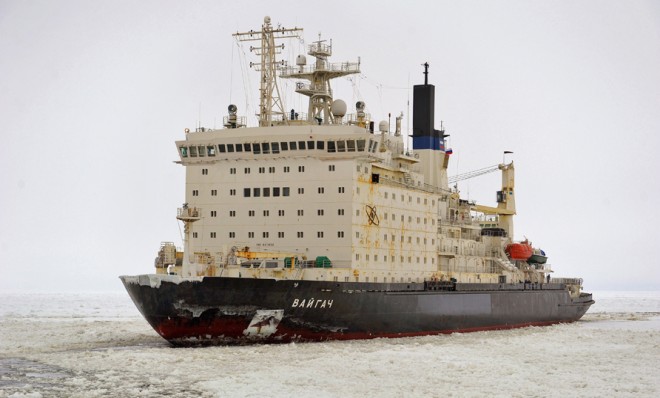Why floating nuclear power plants might actually be a good idea
Russia wants nuclear power-generating ships by 2016. It's not as crazy as it sounds

A free daily email with the biggest news stories of the day – and the best features from TheWeek.com
You are now subscribed
Your newsletter sign-up was successful
At first, the idea of floating nuclear plants seems kind of dangerous, especially after an earthquake and tsunami knocked out the coastal Fukushima Daiichi power plant in Japan in 2011.
Russia's biggest shipbuilder, however, plans to have one ready to operate by 2016. Is this a brilliant solution to the country's energy problems or a recipe for floating Chernobyls?
Proponents of wind, solar, and other sources of clean energy may not be too happy. Not only is there the question of Russia's less-than-stellar record of nuclear waste disposal, there is also the fact that the floating power plants are being designed to power offshore oil-drilling platforms in the Arctic, according to RT.
The Week
Escape your echo chamber. Get the facts behind the news, plus analysis from multiple perspectives.

Sign up for The Week's Free Newsletters
From our morning news briefing to a weekly Good News Newsletter, get the best of The Week delivered directly to your inbox.
From our morning news briefing to a weekly Good News Newsletter, get the best of The Week delivered directly to your inbox.
Still, the barges themselves don't seem to be any more dangerous than Russia's nuclear-powered ice-breaker ships, which use the same KLT-40 naval propulsion reactors. The reactor-equipped barges would hold 69 people, and would have to be towed to their locations. They would also be able to power 200,000 homes, and could be modified to desalinate 240,000 cubic meters of water per day.
Each barge's set of two KLT-40 reactors would produce 70 megawatts of electricity — nothing to laugh at, but far less than the 3,937 megawatts produced at America's largest nuclear power plant in Palo Verde, Ariz. Russia's Rosenergoatom, the state-owned builder of the floating power plants, says it will keep the enrichment levels far below the weapons-grade threshold established by International Atomic Energy Agency (IAEA).
Of course, no nuclear reactor is completely safe. Back in 2010, when a prototype was tested near St. Petersburg, experts fretted to TIME about whether the shipbuilder would skimp on containment structures and auxiliary safety systems.
There is also the concern that terrorists could seize one of the boats — either in Russia or in the territory of a proposed customer like China or Indonesia — and either steal radioactive material or blow up the reactor.
A free daily email with the biggest news stories of the day – and the best features from TheWeek.com
Still, those risks are already present in ships that exist today. Indeed, environmentalists may be more concerned about the floating nuclear power plants opening up the Arctic — home to 13 percent of the world's untapped oil reserves — to increasingly aggressive drilling operations.
Keith Wagstaff is a staff writer at TheWeek.com covering politics and current events. He has previously written for such publications as TIME, Details, VICE, and the Village Voice.
-
 6 of the world’s most accessible destinations
6 of the world’s most accessible destinationsThe Week Recommends Experience all of Berlin, Singapore and Sydney
-
 How the FCC’s ‘equal time’ rule works
How the FCC’s ‘equal time’ rule worksIn the Spotlight The law is at the heart of the Colbert-CBS conflict
-
 What is the endgame in the DHS shutdown?
What is the endgame in the DHS shutdown?Today’s Big Question Democrats want to rein in ICE’s immigration crackdown